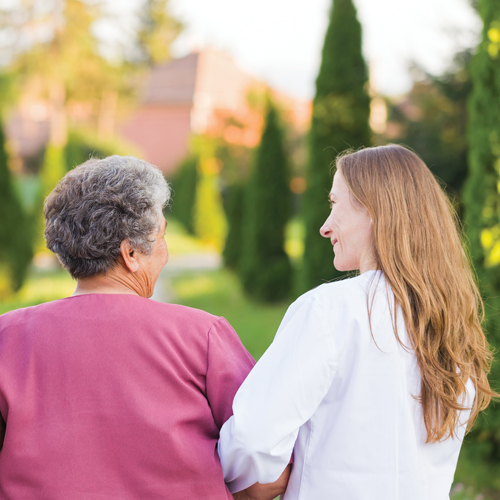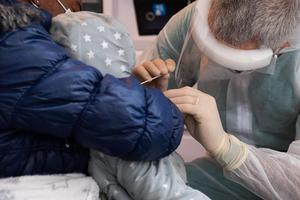Caring for Loved Ones With Alzheimer’s
Patients and Families Turn to the Church in the Battle With Declining Mental Health

According to the Alzheimer’s Association, more than 5 million Americans are living with Alzheimer’s disease.
As the Church teaches, visiting and caring for the sick is a corporal work of mercy (Catechism of the Catholic Church, 2447).
“When we serve the poor and the sick, we serve Jesus. We must not fail to help our neighbors, because in them we serve Jesus,” as St. Rose of Lima said.
Family members who care for loved ones with Alzheimer’s have come to see the truth of this spiritual wisdom.
Colleen Carroll Campbell will always treasure the life lessons she learned from her father, Thomas, as he battled Alzheimer’s disease.
“My father and his strong Catholic faith profoundly shaped my own spiritual life, and that was never truer than in the dozen years that I watched my father battle Alzheimer’s disease,” Campbell explained.
In her memoir, My Sisters the Saints, which was released in paperback last September, she recounts what her dad taught her about faith and suffering. “Through the joyful way he embraced the heavy cross of dementia, and through a lifetime of seeing trials as a means to grow closer to Jesus, my dad taught me that there is no wasted suffering in this life, and everything we endure can draw us closer to Jesus. I learned through watching him that there truly is a love stronger than death, stronger even than dementia.”
For Campbell, her Catholic faith was pivotal during the time her father battled with Alzheimer’s disease, a progressive brain disorder that damages and destroys brain cells, affecting memory and other brain functions. She observed, “I’m not sure how people without faith face a trial like Alzheimer’s. For my part, I simply can’t imagine trying to make sense of it apart from my Catholic faith, from the knowledge that Jesus has redeemed our suffering with his own. My family and I found great consolation in the knowledge that God uses even these most painful crosses as a way to purify us and our loved ones and draw us closer to himself, closer to heaven.”
Impacts Patients and Caregivers
In the last year or so, family and friends reportedly provided more than 17 billion hours of unpaid care to those with Alzheimer’s and other forms of dementia. Alzheimer’s takes physical, emotional and spiritual tolls on caregivers, too.
Molly Kerr experienced this challenge during the seven years that her mother, Joyce, struggled with dementia and Alzheimer’s, especially at the end of her mother’s life, which she spent in the memory-care unit of a senior-living community. “The last year of her life was very difficult on me, as I was one of her primary caregivers,” Kerr described. “I met with the staff regarding her care and handled all of her affairs. I tried to keep a sense of humor when she would introduce me as her sister. The small glimpses I would get of the mother I knew, when she was attending Mass or holding her rosary beads, let me know that her faith was still there and stronger than ever. At the very end, knowing the faith-filled woman that she was gave me the strength to tell her it was okay to go and that God was ready for her.”
Kerr, and her daughter, Anna, 25, turned to their Catholic faith for strength during this time and after Joyce’s death at age 88 in October 2013.
“We had great support from those in the Church,” Anna remembered. “This time also strengthened my relationship with prayer. I found myself praying more often and for longer periods of time. My grandmother was Catholic and raised our whole family in the faith. She always had rosaries around her apartment, and while she may not have known what they were or how to say a Rosary at times, she always knew they were important. Seeing this showed me that even if your memory is fading, your faith is still there.”
Seeking Prevention and Support
World-renowned neurologist Dr. Vincent Fortanasce specializes in Alzheimer’s treatment at his neurology center in Arcadia, Calif. He was motivated to devote his medical career to studying, treating and preventing Alzheimer’s after his father battled the disease, at which time Fortanasce found that the medical profession did not seem to have any answers. In addition to devoting a large portion of time in his practice to treating Alzheimer’s patients and helping prevent the disease in patients with mild cognitive impairment — a precursor to Alzheimer’s — Fortanasce authored the book The Anti-Alzheimer’s Prescription: The Science-Proven Prevention Plan to Start at Any Age, in order to teach others how to curb the rising rate of Alzheimer’s through diet, exercise, “brain boosters” and rest. He is also the co-host of EWTN’s Remembering Jesus (EWTN.com/series/shows/remembering-jesus/index.asp).
Fortanasce recognizes the devastating impact that Alzheimer’s has not only on patients, but on their caregivers. “Caregivers are often drained by 24/7 care,” Fortanasce explained. As a doctor and a devout Catholic, he thinks that the Catholic Church can lead the way in supporting caregivers. “The Church can galvanize support groups. There are a number of people in parishes who are doctors, social workers and nurses. These people can offer courses and set up ways to help caregivers so they do not get burned out.”
Those looking for physical care of loved ones with Alzheimer’s beyond what they can provide are encouraged to contact their diocese or Catholic Charities directly, in order to inquire about resources and daycare centers. For spiritual support, caretakers can seek counsel from local priests and deacons at the parish level.
Fortanasce also hopes that more Catholic parishes will begin offering seminars on Alzheimer’s prevention, since, according to Fortanasce, 40% of baby boomers are forecasted to be diagnosed with Alzheimer’s in the next 20 years. In the meantime, Fortanasce encourages people to visit his website, HealthyBrainMD.com, to get the resources they need — either as a patient or caregiver — to tackle or prevent Alzheimer’s.
Comfort in Faith
Drawing on the strength and comfort she received, Campbell reassures others caring for loved ones with Alzheimer’s that they can turn to their faith to help them through the ups and downs of mental-health deterioration. “The greatest help the Church offers those struggling with this disease is the help all of us, in every trial, need most: the comfort of the sacraments, the presence of Jesus in the word and Eucharist. Of course, the Church also has a growing number of ministries for older folks walking this road and for their caregivers, including adult daycare centers.”
She added, “Look for the person you love behind that Alzheimer’s mask. Don’t forget that he or she is still in there. Watch for the blessings hidden in this trial. They are there. And they can change your life and deepen your faith, if you let them.”
As Pope Francis reminded the faithful in his message for the 23rd World Day of the Sick, celebrated Feb. 11, “Wisdom of the heart means being with our brothers and sisters. Time spent with the sick is holy time. It is a way of praising God.”
He added, “Today, too, how many Christians show, not by their words but by lives rooted in a genuine faith, that they are ‘eyes to the blind’ and ‘feet to the lame.’ They are close to the sick in need of constant care and help in washing, dressing and eating. This service, especially when it is protracted, can become tiring and burdensome. It is relatively easy to help someone for a few days, but it is difficult to look after a person for months or even years, in some cases when he or she is no longer capable of expressing gratitude. And yet what a great path of sanctification this is: In those difficult moments, we can rely in a special way on the closeness of the Lord, and we become a special means of support for the Church’s mission.”
Katie Warner
writes from California.

















